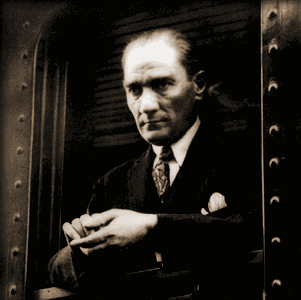This student report was prepared for Ecological Modernization and Rural Development Course during my Erasmus Exchange period in University of Helsinki (January-May 2008). This report graded as 5/5 by the professor. For who want to use some parts of this report please indicate in your references as:
Gurkan, O. 2008. "Ecological Modernization and Rural Development: ROOTS, THEORY AND PRACTICE" University of Helsinki, Course Report Theme 1. Web site: www.abtarim.blogspot.com
-------ROOTS, THEORY AND PRACTICE
The theory of the ‘ecological modernization’ was born in 1980s and discussed and developed by a large group of experts including environmental social scientists, researchers from political and sociological disciplines during 1990s (especially Germany, Netherlands, UK and USA) [1]. During the development process of Ecological Modernization it is possible to talk about two main concept, Theoretical and Pragmatic policy programme [2].
The first ideas was introduced by a German Social Scientist Joseph HUBER – better to call as the Father of Ecological Modernization Theory- in early 1980s. In his theoretical studies, he promotes the idea that environmental problems could be addressed through super industrialization [1].
Regarding to his works, he stated that the super industrialization involves addressing environmental problems primarily through the transportation of production via the development and application of more sophisticated technologies, or need for an ecological switchover [2]. His theory was based on ecological modernization has more in common with strong versions of sustainable development in that envisages a process of the progressive modernization of institutions of modern society [2]. In the editorial article of Murphy (2000) [1], the formulized the Huber’s ideas with his own quotes
“…the dirty and ugly industrial caterpillar will transform into a ecological butterfly”.
It is easy to understand from this quote; Huber’s theory of ecological modernization (EM) requires having a heavily industrialized economy. He summarized the timeline through the environmental modernization in three phases [1]:
1. Industrial Breakthrough (1789-1848)
2. Construction of Industrial Society (1848-1980)
3. Ecological modernization (since 1980)
So, regarding to the timeline first steps were mostly economy and technology oriented production process and in the third step rising awareness to forestall the harmful impacts of the human activities - which can be summarized as restructuring the industry, institutional reflexivity and transformation of society. However the Huber’s theory was excluding the role of government -just as intervention to the industrial sector- and social movements –as NGOs and public-. Following his theory different scientist developed the ideas on EM. The main determination was formulized as, restructuring the national economies: “…EM seeks to shift the emphasis of the macro-economy away from energy and resource intensive industries towards service and knowledge intensive industries” [1].
Further studies; introduce the role and main concept of ecological sound policy-making [1]:
1. There is no necessary conflict between environmental protection and economical growth and that they may in fact be mutually supportive.
2. Integration of the environment in other policy areas: effective environmental protection can only be achieved, through integrating the goals into related policy areas like, economy, energy, agriculture, transport, etc…
3. Economization of ecology: introduction of economic concepts, mechanisms and principles into environmental policy. Natural resource management, eco-tourism.
4. Support and intervention on invention, innovation, diffusion of new technologies and techniques. For example: green technologies or waste free technology industrial ecology, Natural Capitalism… [3]
During the development process of EM, one of the most important strands was on institutional reflexivity and transformation of the society. Hajer (1993 and 1995 as determined in Gibbs,D. 2000 and Murphy,J. 2000) put forward two translations of EM. First institutional reflexivity, which reminds the sustainable development and very democratic process where the institutions choose their own pathways (development or non development). Second interpretation was techno administrative EM which involves economization of nature and elitist decision-making where experts determine problems and solutions in less democratic way. The first reading was also known as strong ecological modernization and second one is weak. On the other hand, during the development period of the EM theory, it is easy to see that many researches interpreting the Ecological Modernization as a theory mainly address the solutions for the environmental problems in the industrialized (or super industrialized) countries and does not raise global distributional questions while reading the Sustainable Development (SD) theory which tide closely to global environmental issues of global justice. Therefore, against these researchers Langbelle (as formularized in Massa and Andersen, 2000), underlines that ecological modernization should be seen as a necessary component of SD, but not an alternative [4].
However, for the nation-states, the green business or economization of the ecology offers some win- win solutions for the which can be summarized as investment in innovation or environmental friendly production or technologies means having larger share in near future of the green industry (next industrial revolution the Natural Capitalism) or using the nature as a business means new employment areas and social sustainability [5].
During the implementation of the EM theory, as a pragmatic political programme it will be supported by business as it involves financial advantage. It was also possible to see this approach of the business in establishment of regional development agencies (RDAs) in UK and while setting up their main objectives as an example. At the beginning the Regional development commission was claimed on that the RDAs must adopt EM principles in their regions, however the implementation of the programs wasn’t been easy in the means of working in cooperation with the local and regional partners. Reason lays under the problem was environmental protection is relevant to development because high quality natural environments area prerequisite to attract inward investment, high value employment and tourist activity. So regions need to growing economy to create the resources need to address the environmental problems, and then the improved competitiveness will turn the regions addressing social and environmental problems [2].
Addition to above example, also Finnish policy programme in agro-environmental issues can be pointed as another problematic adoption process ecological modernization principles. Finland has carried an agriculture and pollution project that was related to the water pollution caused by the agricultural resources. This example also shows that regarding to the determination of the nitrate vulnerable zones arising conflicts between the farmers’ organization and two ministries (Ministry of agriculture and forestry and Ministry of Environment) were mainly based on the development level of the region [6].
So, maybe these mentioned examples can be a very supportive clue for the Huber’s arguments on more industrialization as solution to ecological crisis.
But, what about the developing world and their environmental and social problems?
References:
1. Murphy, J. 2000. “Editorial: Ecological Modernization”, Geoforum 31 (2000), p.1-8
2. Gibbs, D. 2000. “Ecological modernisation, regional economic development and regional development agencies” Geoforum 31 (2000), p.9-19
3. Anonymous, 2007. Wikipedia Website: http://en.wikipedia.org/wiki/Ecological_modernization
4. Massa, I. and Andersen, M.S. 2000. “Special Issue Introduction: Ecological Modernization”, Journal of Environmental Policy & Planning 2: 265-267
5. Hawken, P, Lovins, A. and Lovins, H. 1999. “Natural Capitalism: Creating The Next Industrial Revolution” Rocky Mountain Institute Publications.
6. Jokinen, P. 1998. “Europeanisation and Ecological Modernisation: Agri-Environmental Policy and Practices in Finland” International workshop on ecological Modernization in university of Helsinki, Finland.



Hiç yorum yok:
Yorum Gönder